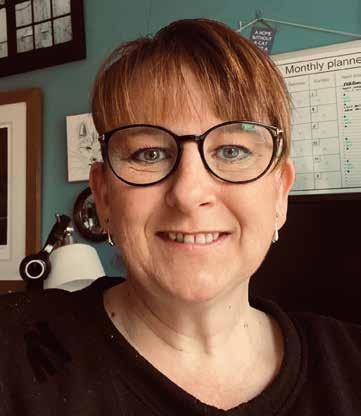
3 minute read
‘No two days are the same’
How does Gas Safe Register inspect a business that employs hundreds of gas engineers?
We talk to Business Relationship Manager
Claire Hammond to find out.
Larger gas businesses go through regular inspection in the same way that sole traders and smaller companies do. But Gas Safe Register also makes additional checks on their processes and procedures to make sure that they’re working safely and complying with the rules of registration. That’s what Claire Hammond does. She’s one of 10 business relationship managers based around the UK.
Claire is responsible for around 140 businesses based in the South and South-east of England, all of which employ 10 or more engineers – in fact, her biggest company has more than 440 on its books.
More checks
For engineers employed by bigger businesses, their inspection is much the same as for sole traders and small companies, on a rolling five-year basis. But the business itself goes through additional checks. “First we carry out a desktop audit, where we check that they have all the necessary structures and paperwork in place to support their engineers,” says Claire. “I ask to see a minimum of five engineers’ details so that I can check through and see what information they’re capturing.
“Engineers have to have the right tools and equipment to do their jobs safely. I need to make sure that their responsible person does actually check the back of the van so that they have everything they need, such as leak detection fluid and pellets, and that all their equipment is fit for purpose, such as analysers being within their calibration date.”
Claire also checks that there are effective processes in place for gas engineers to receive important safety information such as Technical Bulletins, Industry Standard Updates and Registered Gas Engineer magazine, and that they have access to Gas Safe Register’s website. “We want to know how they make sure that engineers receive new information and that they understand it.”
When it comes to engineers themselves, not everyone can be inspected. “For a business with 10 engineers, for example, we’ll spend around half a day with three engineers on three different jobs. For bigger organisations, we might spend a week with them so that we can cover a different cross-section of their engineers and work.”
With responsibility for such a variety of businesses and gas work, it’s no surprise that Claire is highly qualified and has competences in almost every area. Just like gas engineers, she has to keep on top of her ACS qualifications. “I re-sat all my domestic and LPG last year,” she says. “And next year I’ll go through all the commercial ACS again. Fortunately I do get a two-year break in between.”
All Gas Safe inspectors receive a great deal of additional training throughout the year. “We have regular training on topics such as ventilation requirements or pipework sizing, for example. And our technical support inspector keeps us up to date about the regulations at our regular team meetings.
“I’ve also recently completed ISO 9000 training [quality management] and modules on site safety and gas on Guernsey as it’s slightly different from natural gas.”
Away from work, Claire and her partner like to spend time socialising between Brighton and London. She also enjoys discovering local history. “One of the best ways to learn about a town is to go on a ghost walk. I’ve been to one in Stockholm and it’s a fun way to find out more.
“There are also a lot of walking tours around London, where a guide will meet you and walk around with you, showing you the odd stuff that’s not in the history books. You’ll see things you wouldn’t usually see.”
All change
It’s all a big change from Claire’s previous work. She joined the Register five years ago, having been an experienced service and breakdown engineer. “I started my apprenticeship with British Gas in 1991 and I contracted for five years afterwards. I was also a service and breakdown engineer at Baxi Heating for 15 years.”
She had considered working at the Register previously but finally took the plunge when she saw her role advertised in this magazine. “I thought I’d go for it because my knees and back were aching,” she says.
Having joined, Claire says she values the support she receives from her colleagues. “You’re supported with whatever you want to do at Gas Safe. When I first joined, I was getting phone calls from people I didn’t work with, saying hello, having a chat and offering help if I wanted it.

“I really enjoy my job; I get to see so many different businesses and different types of work and no two days are the same. I’ve worked on some estates where you wouldn’t leave your car unattended and then in the centre of London on the 20th floor because that’s where the boiler room is. It’s such a varied role.
“I am one of the team. It’s a nice to be in a position where you can say to other female engineers that there is a future: it’s not a lad’s gang any more. Anyone who wants to work at Gas Safe Register who’s got the qualifications has got the opportunity – a genuinely equal opportunity.”
The NHXM is monobloc, available in 7 outputs from 4 to 16kW (in 2kW increments) and is MCS approved for funding under the Boiler Upgrade Scheme. For a complete solution, a complementary range of pre-plumbed unvented cylinders, with an integral 50 litre buffer vessel, are available in 170, 200, 250 and 300 litre capacities.





